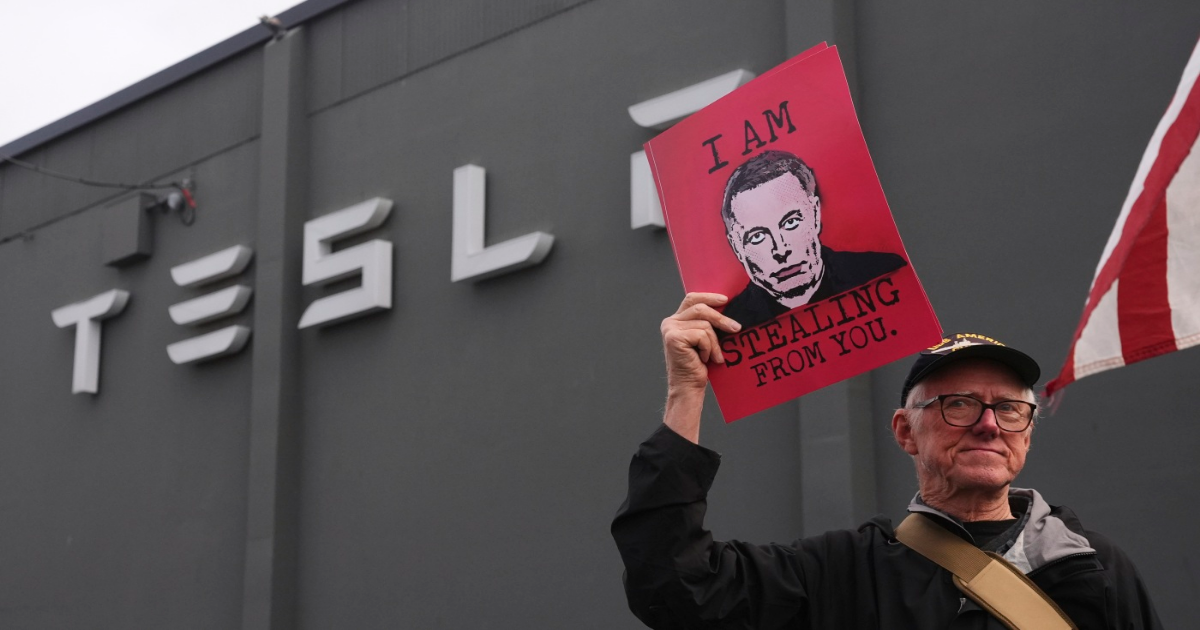
Global deliveries of Tesla’s flagship electric car models fell sharply in the first quarter — down 13% compared to last year — the company announced Wednesday. The drop comes as increasing competition erodes Tesla’s market share and CEO Elon Musk’s role as President Trump’s cost-cutting tsar sparks a backlash among consumers.
The results, released before the opening bell on Wall Street, sent Tesla’s already battered shares — which have lost 35% of their value since the start of the year — down even further in early trading. Before noon, however, the share price had rallied.
The sales report shows the biggest-ever quarterly decline in sales for Tesla, which delivered 336,681 vehicles in the first three months of the year compared to 386,810 from the same period in 2024. Analysts had expected a dip, but not one so steep, with an average estimate of 372,410 deliveries.
“I might call it a disaster,” says Daniel Ives, managing director at Wedbush Securities. Wall Street was “anticipating softness, but this was, I think, one of the worst delivery quarters relative to the original expectations in the last few years,” he says.
Ives, who has been bullish on Tesla in the past, says part of the blame rests with Tesla’s failure to refresh its vehicle lineup, but most of the trouble comes from “Musk self-inflicted brand issues.”
The controversial Tesla CEO “needs to change course because if we continue down this path, [there are] dark days ahead for Tesla,” Ives says.
It’s a sentiment echoed by other analysts. Gene Munster, a managing partner at Deepwater Asset Management, posted on X in February that “the catalyst” for lowered expectations for Tesla “has been Musk’s increased political visibility, alienating buyers.”
Musk, who backed Trump in the 2024 election and donated more than a quarter of a billion dollars to his campaign, has become a key figure in the new administration’s push to reduce government spending. As the head of the Department of Government Efficiency, or DOGE, Musk is the public face of often unpopular cuts, which include the elimination of entire agencies. His moves have sparked widespread anger, triggering massive protests at Tesla stores and acts of vandalism targeting the company’s vehicles, chargers and storefronts.
Most recently, Musk poured some $20 million into a Wisconsin Supreme Court race in an unsuccessful effort to tip the court in Republicans’ favor. Speaking at a rally in the state ahead of Tuesday’s poll, Musk acknowledged that working for the White House was “a very expensive job” and that “my Tesla stock and the stock of everyone who holds Tesla has gone roughly in half.” (Liberal judge Susan Crawford won the race, which will keep the court leaning in Democrats’ direction.)
The slumping sales come despite the Trump administration’s efforts to help sell Teslas. Last month, Trump even showed off several Tesla models at the White House and vowed to buy one for himself in an apparent bid to boost sales. That was followed by Commerce Secretary Howard Lutnik saying in an interview with Fox News that people should “buy Tesla” shares.
Sales have also been falling substantially across Europe in recent months.
Some experts say the only way Tesla can recover its brand image is to ditch Musk as CEO. But Ives doesn’t think that’s the answer.
“I continue to believe he’s really the CEO of Tesla and … likely [will be] for another 5 to 10 years,” Ives says. “[But] he’s going to have to take a step back from DOGE and start to actually become more involved [at Tesla].”
